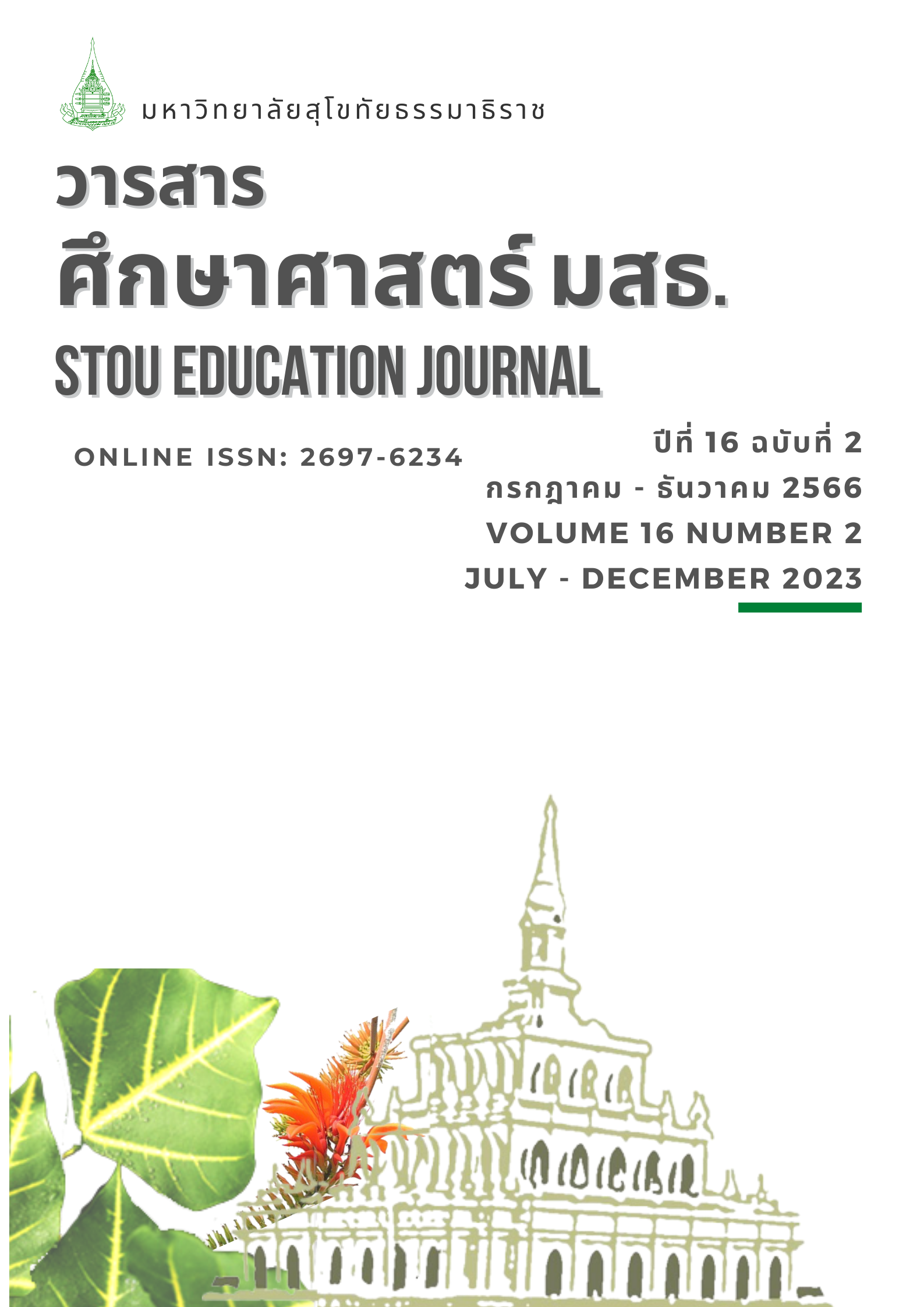The Effects of Phenomenon- Based Learning Experience Provision on Self -Acquiring Knowledge Skills of Young Children
Main Article Content
Abstract
The purpose of this study was to examine the effects of phenomenon-based learning experience provision on self- acquiring knowledge skills of young children, specifically in the areas of observation and asking questions, planning, data processing, summarizing results, and disseminating knowledge. The sample consisted of 22 children, aged 4-5, from Kindergarten 1, Classroom 3, during the academic year 2022 at Wat Khubon (Wattananan Uthit) School in Bangkok. They were selected through cluster sampling. The study employed 2 main instruments: 1) learning experience plans, which consisted of 4 steps: (1) observing the phenomenon, (2) asking questions based on children's interests, (3) practicing self-acquiring knowledge, and (4) summarizing, presenting, and reflecting; and 2) a self-acquiring knowledge skills assessment form for young children, consisting of sections on (1) observing and asking questions, (2) planning, (3) data processing, and (4) summarizing results and disseminating knowledge. The data were analyzed using mean, standard deviation, t-test, and content analysis. The results of the study indicated that young children who participated in phenomenon-based learning experience provision exhibited significantly higher self-acquiring knowledge skills at the .01 level, both overall and in each aspect. The children were able to use open-ended questions to explore their curiosity, search for information, explain their findings, and co-plan their search. They utilized their senses to gather information and expressed their reflections through drawing. They successfully connected their discoveries to present and communicate their knowledge.
Article Details
References
กระทรวงศึกษาธิการ. (2560). หลักสูตรการศึกษาปฐมวัย พุทธศักราช 2560. โรงพิมพ์คุรุสภาลาดพร้าว.
กมลทิพย์ กองเทพ, อรพรรณ บุตรกตัญญู, ปัทมาวดี เล่ห์มงคล, และ พงศธร มหาวิจิตร. (2565). การศึกษาการจัดประสบการณ์การเรียนรู้แบบโครงการ โดยใช้ปรากฎการณ์เป็นฐาน เพื่อพัฒนาทักษะการทำงานร่วมกัน ของเด็กปฐมวัย. วารสารศึกษาศาสตร์ มหาวิทยาลัยสงขลานครินทร์ วิทยาเขตปัตตานี, 33(3), 151-167.
ชลาธิป สมาหิโต. (2562). การจัดประสบการณ์การเรียนรู้โดยใช้ปรากฎการณ์เป็นฐานสำหรับเด็กปฐมวัย. วารสารมหาวิทยาลัยศิลปากร, 39, 113-129.
โรงเรียนวัดคู้บอน (วัฒนานันท์อุทิศ). (2564). รายงานประจำปีของสถานศึกษา (การศึกษาปฐมวัย) ปีการศึกษา 2564. สำนักงานเขตคลองสามวา กรุงเทพมหานคร.
วรานิษฐ์ ธนชัยวรพันธ์, ยศวีร์ สายฟ้า, และ ศศิลักษณ์ ขยันกิจ. (2565). การพัฒนารูปแบบการจัดประสบการณ์การเล่นแบบชี้แนะโดยใช้แนวคิดกิจวัตรการคิดร่วมกับการสอนอย่างมีจุดมุ่งหมายเพื่อส่งเสริมทักษะการแสวงหาความรู้ของเด็กอนุบาล. วารสารสังคมศาสตร์ และมานุษยวิทยาเชิงพุทธ, 7(12), 381-396.
วชิราภรณ์ ศรีผา. (2554). ผลการจัดกิจกรรมทัศนศึกษาวัฒนธรรมท้องถิ่นเพื่อพัฒนาทักษะการแสวงหาความรู้ด้วยตนเองของเด็กปฐมวัย [วิทยานิพนธ์การศึกษามหาบัณฑิต, ไม่ได้ตีพิมพ์]. The Central Library of Srinakharinwirot University. https://ir.swu.ac.th/jspui/handle/123456789/1187
สำนักงานเลขาธิการสภาการศึกษา. (2561). มาตรฐานการศึกษาของชาติ 2561. กลุ่มมาตรฐานการศึกษา สำนักมาตรฐานการศึกษาและพัฒนาการเรียนรู้ สำนักงานเลขธิการสภาการศึกษา, บริษัท 21 เซ็นจูรี่ จำกัด.
สำนักการศึกษา กรุงเทพมหานคร. (2563). แผนพัฒนาการศึกษาขั้นพื้นฐาน กรุงเทพมหานคร ฉบับที่ 3 (พ.ศ.2564 -2569). วันไฟน์เดย์.
เสกสรร มาตวังแสง. (2561). การพัฒนารูปแบบการจัดประสบการณ์เพื่อส่งเสริมทักษะการแสวงหาความรู้ด้วยตนเองของเด็กปฐมวัย. วารสารวิชาการศึกษาศาสตร์, 19(2), 182-196.
สุกัญญา บุญเปี่ยม. (2565). การพัฒนารูปแบบการจัดประสบการณ์ที่ส่งเสริมความสามารถในการคิดแก้ปัญหาและความสามารถในการแสวงหาความรู้ของเด็กปฐมวัยชั้นอนุบาลปีที่ 3. วารสารมหาวิทยาลัยมหามงกุฎราชวิทยาลัยวิทยาเขตร้อยเอ็ด, 11, 176-190.
อรพรรณ บุตรกตัญญู. (2561). การเรียนรู้โดยใช้ปรากฏการณ์เป็นฐานเพื่อการสร้างมุมมองแบบองค์รวมและเข้าถึงโลกแห่งความเป็นจริงของผู้เรียน. วารสารครุศาสตร์ จุฬาลงกรณ์มหาวิทยาลัย, 46 (2), 348-365.
Australian Curriculum, Assessment and Reporting Authority. (2015). The Australian Curriculum: Science. https://www.australiancurriculum.com
Cole, M., John-Steiner, V., Scribner, S., & Souberman, E. (1978). Mind in society: Mind in society the develop-ment of higher psychological processes. Harvard University Press.
Dewey, J. (1986). Experience and education, The Educational Forum, 50(3), 241-252.
Fosnot, C. T. (2013). Constructivism: Theory, perspectives, and practice. Teachers College Press.
Hedges, H. (2022). Children’s interests, inquiries and identities: Curriculum, pedagogy, learning and out-comes in the early years. Routledge.
Ministry of Education Republic of Singapore. (2013). Nurturing early learners: A curriculum for kindergartens in Singapore discovery of the world, 3, https://www.nel.moe.edu.sg/qql/slot/u143/Resources/Downloadable/pdf/nel-guide/nel-edu-guide-overview.pdf
O’Connor, G. & Rosicka, C. (2020). Science in the early years. Paper 2: Science inquiry skills. Australian Council for Educational Research.
Papert, S. & Harel, I. (1991). Situating constructionism. Constructionism, 36(2), 1-11.
Piaget, J. (1951). The child's conception of physical causality. (212). Transaction Publishers.
Symeonidis, V. & Schwarz, J. F. (2016). Phenomenon-based teaching and learning through the pedagogical lenses of phenomenology: The recent curriculum reform in Finland. Forum Oswiatowe, 28(2), 31–47.


